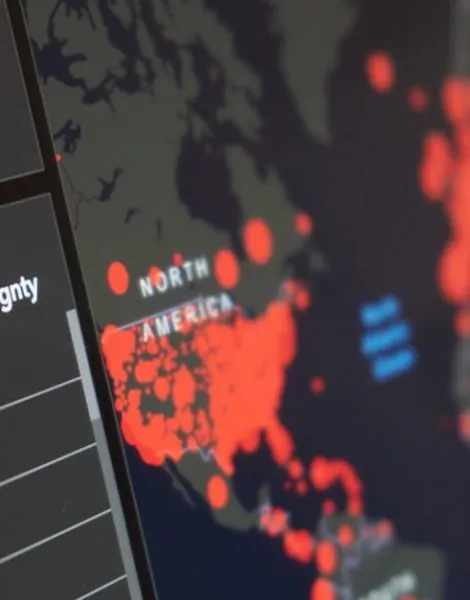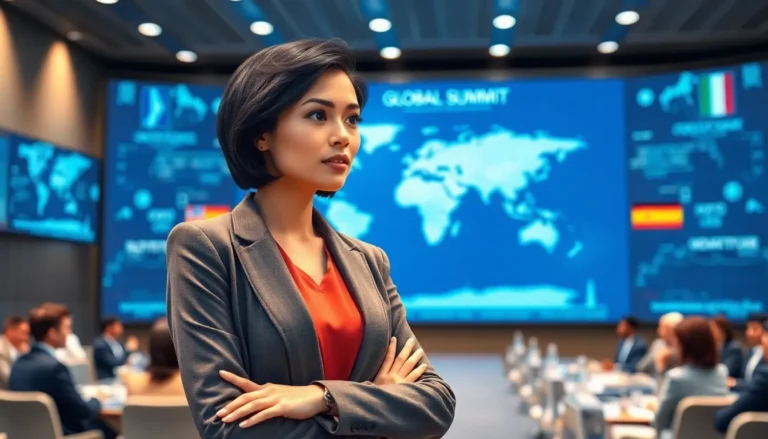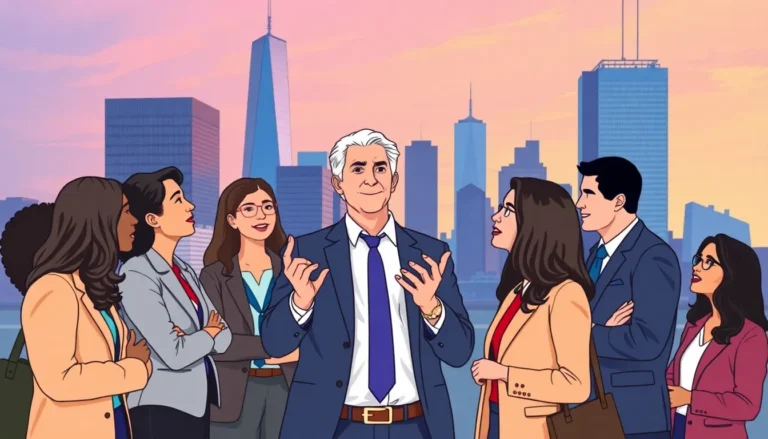In a world that often feels like a game of political musical chairs, emerging leaders are stepping up and shaking things up. These fresh faces aren’t just here to fill a seat; they’re ready to redefine the rules of the game. With charisma that can light up a room and ideas that could make even the most seasoned politicians raise an eyebrow, these leaders are the ones to watch.
From tackling climate change to championing social justice, their agendas are bold and their ambitions are sky-high. As the old guard clings to power, it’s the innovators and disruptors who are capturing the spotlight. Buckle up, because the future looks bright—and perhaps a little unpredictable—with these trailblazers leading the charge.
Table of Contents
ToggleOverview of Emerging World Leaders
Emerging world leaders represent a shift in global governance, dedicated to addressing pressing challenges. Political figures from diverse regions arise, championing innovative approaches in their respective nations. These leaders prioritize climate change initiatives to combat environmental degradation. In addition, they advocate for social justice reforms to bridge inequality gaps within society.
Charismatic presence characterizes many of these new leaders, allowing them to connect with younger populations. Public engagement is often one of their strategies, utilizing social media to disseminate ideas and ignite discussions. Policy changes become more inclusive, reflecting the needs of a broader constituency.
Many emerging leaders challenge traditional power dynamics, pushing for transparency and accountability in governance. Development issues, like healthcare accessibility and education reform, gain prominence in their agendas. Visionary concepts often drive their policies, seeking sustainable solutions that foster long-term progress.
International relations also reflect shifts in leadership styles. Collaborative efforts among nations emerge, focusing on collective solutions for global issues. Active participation in multilateral forums highlights their commitment to diplomacy and cooperation.
Countries witnessing these transformations include Brazil, India, and South Africa, where elections usher in fresh perspectives. As they navigate complex geopolitical landscapes, emerging leaders seek innovative partnerships that transcend borders. This new wave of leadership signals a pivotal moment in the evolution of global politics, shaping the agendas and ideologies of tomorrow.
Key Characteristics of Emerging World Leaders
Emerging world leaders display distinct qualities that enhance their impact on global governance. These attributes facilitate the navigation of today’s complex political landscape.
Vision and Innovation
Creativity ranks high among the traits of emerging leaders. Innovative solutions to pressing problems like climate change define their agendas. They envision a future where sustainability takes precedence. Strategic thinking and forward-looking policies attract attention from global audiences. New approaches dismantle outdated frameworks and enhance the efficiency of governance. Engagement with technology, particularly social media, aids their ability to disseminate information quickly. Young voters resonate with their fresh ideas and visionary ideals, fueling movements aimed at social change.
Resilience and Adaptability
Adaptability marks another key characteristic of emerging leaders. They confront challenges head-on, demonstrating flexibility in the face of adversity. Resilience enables them to pivot when faced with unexpected obstacles, maintaining a steadfast focus on their goals. This ability garners respect and trust from constituents. Response strategies often incorporate diverse viewpoints, fostering inclusivity and collaboration. These leaders thrive in environments that demand quick thinking, ensuring they remain relevant in shifting political climates. Commitment to continuous learning enhances their capacity to adapt effectively.
Notable Emerging World Leaders
Several emerging world leaders are reshaping the political landscape with their fresh perspectives and innovative ideas. These figures are addressing critical issues and engaging diverse populations.
Profiles of Prominent Figures
Luis Inácio Lula da Silva, Brazil’s president, is focusing on social justice initiatives and sustainable development strategies. Narendra Modi, India’s prime minister, emphasizes economic reforms while strengthening international relations. Cyril Ramaphosa, South Africa’s president, advocates for transparency and anti-corruption measures. Jacinda Ardern, former New Zealand prime minister, is known for her compassionate leadership style and commitment to progressive policies. These leaders are driving meaningful change in their respective countries.
Impact on Global Politics
Emerging leaders are influencing global politics by promoting collaboration among nations. Their focus on climate change and social justice fosters dialogue in multilateral forums. This shift encourages innovative policy-making that addresses pressing global challenges. As a result, emerging leaders are reshaping diplomatic relationships, creating a new network of cooperation. Countries are increasingly recognizing the importance of inclusivity and transparency in governance. This evolution signifies a critical moment in global governance, as traditional power dynamics are challenged and redefined.
Challenges Faced by Emerging World Leaders
Emerging world leaders encounter numerous challenges that influence their ability to implement transformative agendas. Two primary obstacles they face include political resistance and economic constraints.
Political Resistance
Political resistance often manifests from established parties and interest groups unwilling to embrace change. Former paradigms clash with innovative policies, leading to pushback against proposed reforms. Opposition parties may engage in fierce debates, undermining progress on significant issues. Leaders must navigate legislative hurdles while maintaining their vision. Coalition-building becomes essential, as negotiating with various stakeholders can facilitate compromise. Developing strong relationships with constituents can bolster support, creating a more favorable political climate.
Economic Constraints
Economic constraints hinder the ambitious objectives of emerging leaders. Limited financial resources restrict the execution of essential programs aimed at addressing social justice and climate change. High public debt levels can further complicate budget allocations, making it difficult to prioritize new initiatives. They often depend on foreign investment and economic partnerships to stimulate growth. Encouraging innovative economic strategies can attract funding while driving sustainable development. Building resilient economies may involve leveraging technology and fostering entrepreneurship, ensuring sustainability in the face of existing challenges.
Future Outlook for Emerging World Leaders
Emerging world leaders will play a crucial role in shaping global governance in the coming years. Innovative approaches to governance demonstrate their commitment to addressing climate change and social justice. Prioritizing collaboration enhances their ability to tackle critical issues on a global scale. They actively engage younger populations, effectively utilizing social media to amplify their messages.
Key areas of focus include healthcare accessibility and education reform. Leaders recognize that addressing these development issues is essential for sustainable progress. Their policies reflect a deep understanding of the need for inclusivity and transparency in governance. By standing firm against established norms, these leaders encourage dialogue and foster a sense of community.
As international cooperation becomes increasingly important, emerging leaders will prioritize diplomacy in multilateral forums. National transformations in Brazil, India, and South Africa illustrate the shift in political dynamics as fresh ideas gain traction. New leadership signifies an opportunity for redefining traditional power structures and governance norms.
Facing challenges, these leaders must navigate political resistance and economic constraints. Coalition-building becomes vital in overcoming opposition from established parties and interest groups. Furthermore, conditions in the global economy can complicate their ambitious agendas. Responses often involve leveraging foreign investment and implementing innovative economic strategies for sustainable growth.
Notably, influential figures like Luis Inácio Lula da Silva, Narendra Modi, Cyril Ramaphosa, and Jacinda Ardern exemplify the characteristics of this new wave of leadership. Their distinctive styles and progressive agendas pave the way for meaningful change, ultimately shaping the future landscape of global politics.
Emerging world leaders are redefining the political landscape with their innovative ideas and commitment to pressing global issues. Their focus on climate change and social justice showcases a dedication to creating a more equitable future. By leveraging social media and engaging with younger generations, they’re fostering a sense of inclusivity and transparency in governance.
As these leaders navigate challenges such as political resistance and economic constraints, their resilience and adaptability will be crucial in implementing transformative agendas. The shift in power dynamics signifies a pivotal moment in global governance, with these trailblazers poised to influence the direction of international collaboration. The world watches closely as they shape the future of politics, striving for a more sustainable and just society.









